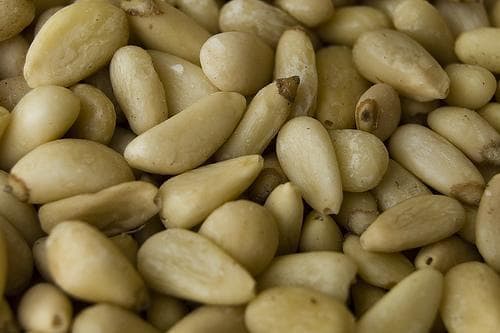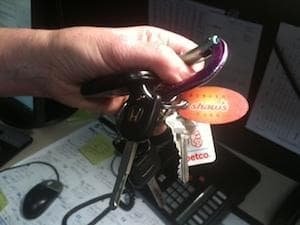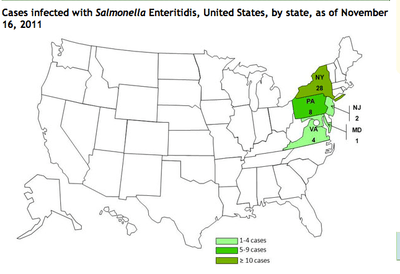Advertisement
How Cards That Track Your Shopping Could Save You From Salmonella

You can't help but find it a bit spooky that stores like Target analyze every little thing you buy to figure out whether, say, you might be in the second trimester of pregnancy and ripe for some major marketing of diapers. Lately, I've felt decidedly queasy about handing over my customer ID card at the supermarket, despite the big discounts.
Now, though, I'm feeling better about it. Turns out that when a supermarket uses your shopper ID to track your purchases, that also means that if there's a recall of contaminated food, the store — if it's so inclined — can use your information to call you and warn you not to eat those Turkish pine nuts you bought last Tuesday.
I use pine nuts advisedly. I recently heard an enlightening talk at a Knight Science Journalism Fellowship event by a top national foodborne-disease detective: Dr. Robert Tauxe, deputy director of the Division of Foodborne, Waterborne and Environmental Diseases at the National Center for Emerging and Zoonotic Infectious Diseases.
[module align="right" width="half" type="pull-quote"]'By the way, you bought this and we think you should know it's associated with an outbreak and has been recalled.'[/module]
He regaled his audience with a series of contaminated-food mysteries and how they were solved using national surveillance networks and ever-more-refined methods. But the one that most stays with me is last fall's outbreak of salmonella in several northeastern states, for an eventual total of 43 cases.
As the cases of Salmonella Enteritidis accumulated, a red flag went up in a surveillance system, and the disease-tracking public health detectives went to work. When the patients were interviewed about what they had recently eaten, Dr. Tauxe said, it emerged that seven out of ten had shopped at a particular chain of grocery stores.

After the patients gave permission, the investigators looked at their shopper card data, and found that all had bought a particular brand of bulk Turkish pine nuts. Within days, the store stopped selling pine nuts, and "did something more and more stores are doing: They sent a robocall to other shoppers who had bought the same nuts saying, 'By the way, you bought this and we think you should know it's associated with an outbreak and has been recalled.'"
Shopper cards are being used increasingly by disease trackers when possible, Dr. Tauxe said. And the identification of pine nuts as the culprits in the salmonella "all started with the clue that what people had in common was shopping at a particular grocery chain."
Shopper cards served a dual use, he concludes: They helped "first to figure out what the actual source of the outbreak was in the first place, and then were also a help to stop the outbreak (with the robocalls)."

Dr. Tauxe did not mention names as he described the case in his talk, but the outbreak and measures to contain it are described on the CDC Website here, and here's the USA Today report from Oct. 27:
ROCHESTER, N.Y. (AP) – Wegmans Food Markets is recalling 5,000 pounds of pine nuts sold in the bulk foods department of its stores in New York, Pennsylvania, New Jersey, Virginia, and Maryland between July 1 and Oct. 18, citing possible salmonella contamination. The upscale grocery store chain says the pine nuts, imported from Turkey by Sunrise Commodities of Englewood Cliffs, N.J., have been linked to an outbreak of gastrointestinal illness from salmonella.
There's an overarching account of the outbreak just recently posted on the Marler Blog, which offers commentary on food contamination.
Note: This post was in no way sponsored by Wegman's Food Markets, which, as The Boston Globe reports here, has been expanding in Massachusetts and may open stores in Boston proper. But if one opens near you and you buy food there, may I suggest the shopper ID card?
This program aired on April 13, 2012. The audio for this program is not available.
